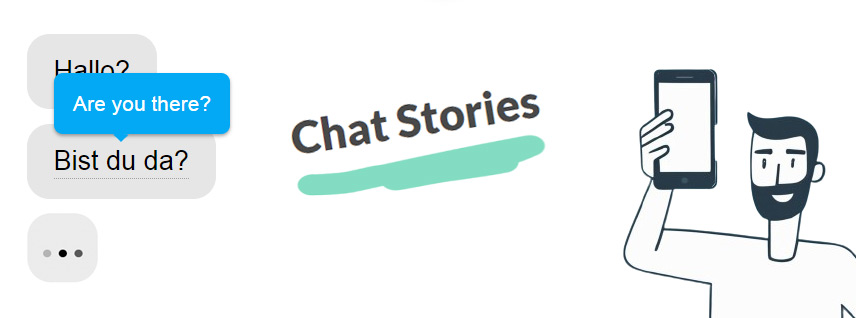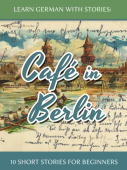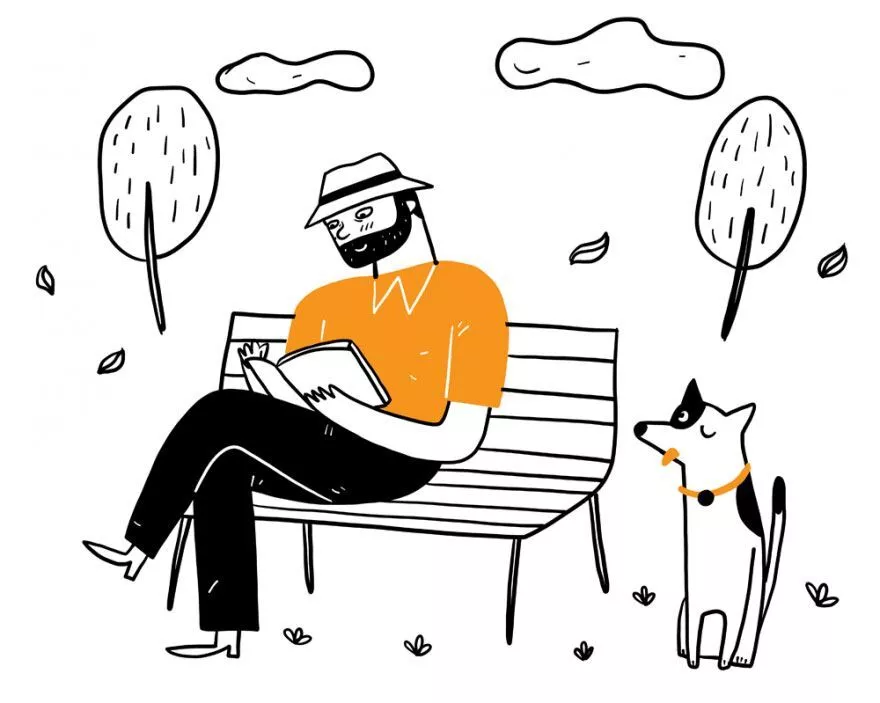
- Fairytales in simplified german
- German Prankster Stories, Folk Tales & Fables
- An Interactive Messenger Story
- René Goscinny in German(re-narration)
- Mark Twain in German (re-narration)
- The Greedy Dog and other German fables
- Post-WWII German short stories
- Short Stories, Novels & More From The Goethe Institute
Learning German with stories is one of the most effective ways to increase your vocabulary and rapidly make sense of grammar in action. It has many benefits and there’s even some interesting brain research on how languages affect our cerebral pathways.
But finding easy German short stories to practice your reading skills can be daunting, especially when combing through websites that are all in German. What are good sources? Do they actually use good German? Are they error-free? Fear not! I’ve done the work for you.
In a previous post about reading simple German short stories for beginners I’ve showcased a handful of literary short stories, mostly from post-war times which are interesting enough but not too difficult for beginners. However, even these required a certain level of German to make sense of.
In today’s post, I want to recommend some stories that are easy to understand and accessible, specifically for those who are just beginning to read German. With these stories, even if you are a novice learner, you can start reading without any delay.
12 Fairytales in Easy German Language
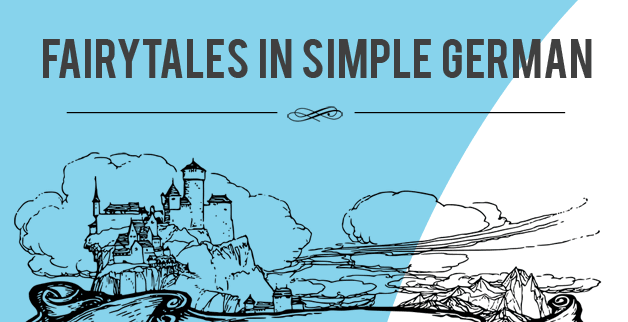
Who doesn’t remember the classic fairy-tales by the Grimm brothers like Hänsel und Gretel, Rotkäppchen (Little Red Riding Hood) or Rapunzel? But if you’ve ever tried reading the original in German, you’ll know that most versions of these stories (especially those found on free websites) are told in a very archaic and baroque German, which is not just hard but almost impossible to fathom for novice learners.
Luckily the simplified German portal of national broadcaster NDR has a number of German fairy-tales rewritten in Einfache Sprache (simple language), so even absolute beginners can enjoy these classic tales. Bonus: They all come with slow professional audio narration, so you don’t have to puzzle over pronunciation.
Start reading (or listening) at ndr.de or select one of the following fairy-tales:
- Rotkäppchen (Little Red Riding Hood)
Note: I recently rewrote this classic as an interactive chat story, revisiting the classic fairytale with a modern twist: Rotkäppchen Reloaded
- Schneewittchen und die sieben Zwerge (Snow White and the 7 dwarfs)
- Rapunzel
- Dornröschen (Sleeping Beauty)
- Die Bremer Stadtmusikanten (The Bremen Town-Musicians)
- Der Wolf und die sieben Geißlein (The Wolf and the Seven Little Kids)
- Der Hase und der Igel (The Hare and the Hedgehog)
- Rumpelstilzchen (Rumpelstiltskin)
- Hänsel und Gretel
- Frau Holle
- Die 3 Federn (The Three Feathers)
- Des Teufels rußiger Bruder (The Devil’s Sooty Brother)
German Prankster Stories, Folk Tales & Fables
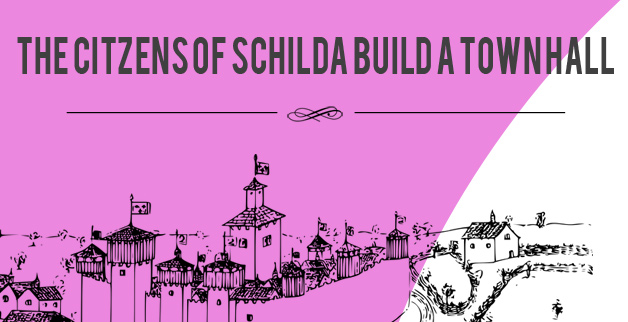
The strange and droll antics of the Schildbürger (“citizens of Schilda”) are similar to the Yiddish Chelm stories or the Wise Men of Gotham in the English speaking world and can make for enjoyable reading practice in German.
I’ve selected the tale of how they built a strange triangular town hall, added in-line translation and found a great narration on Youtube, all of which, including my own re-narration of the introduction to the Schildbürger, you can enjoy right here on the blog.
If you enjoy this format I also prepared the famous “Belling the Cat” fable by Aesop in a similar style. Fables can be a great literary genre for language learners, because they are often short and have a clear central message. If you’re looking for more fables like these, medienwerkstatt has a bunch.
German Chat Stories
If you’re looking for something a bit more interactive, also check out our Chat Stories where you can enjoy German storytelling in bite-sized bits. Pick up vocabulary as you go through the stories, listen to pronunciation of phrases, do little quizzes, collect words, build up your vocabulary and more. Dive right in or read my little “behind-the-scenes” post about this project.
This is available as an in-browser experience, or just simply add it to your home-screen as a progressive web app. No need to download or install anything.
Nick, His Friends And A Photographer, by René Goscinny (And 2 Other Stories)
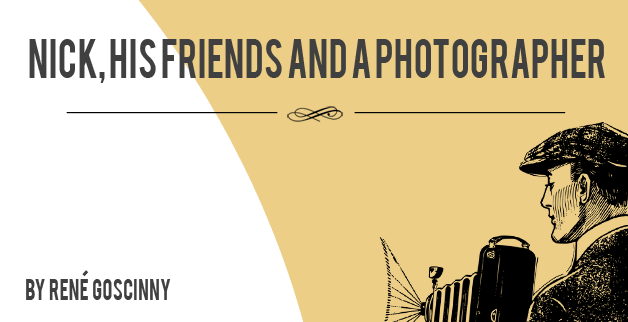
This story is told after a chapter from “Le petit Nicolas” by the popular French author Goscinny, world-renown for the Asterix stories. The authors of deutschalsfremdsprache.ch went to great lengths to retell the story using very simple but grammatically perfect German. This story even comes with a few basic text comprehension questions.
![]() Read PDF via: deutschalsfremdsprache.ch
Read PDF via: deutschalsfremdsprache.ch
If you like this story, there are also two other chapters:
Tom Sawyer And The Garden Fence, by Mark Twain (And 7 Other Stories)
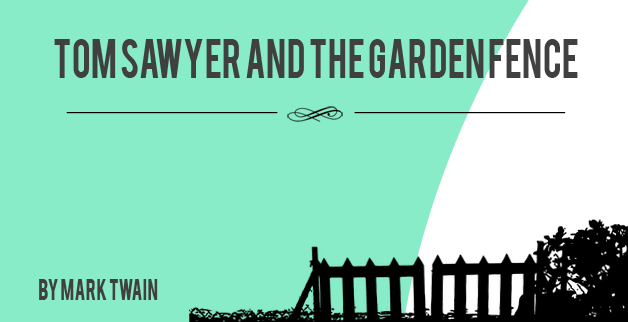
In this retelling of a chapter from Mark Twain’s “The Adventures of Tom Sawyer”, deutschalsfremdsprache.ch did a similar feat like with the above French story: keeping the original narrative and restructuring grammar and vocabulary to make for easy German reading. Just like the above story, this PDF comes with some exercises.
![]() Read PDF via: deutschalsfremdsprache.ch
Read PDF via: deutschalsfremdsprache.ch
Other chapters in this series include:
- Tom Sawyer kommt zu spät
- Tom Sawyer auf dem Friedhof
- Tom Sawyer auf der Insel
- Tom Sawyer und die Gerichtsverhandlung
- Tom Sawyer auf Schatzsuche
- Tom Sawyer in der Höhle
- Tom Sawyer findet einen Schatz
Note: all of these stories come with some exercises, but without an answer key. If you’d like to get the correct answers to all the exercises the owners of this website sell a USB stick containing all their worksheets plus answers.
The Greedy Dog, by Erasmus Alberus (And Tons Of Other Stories)
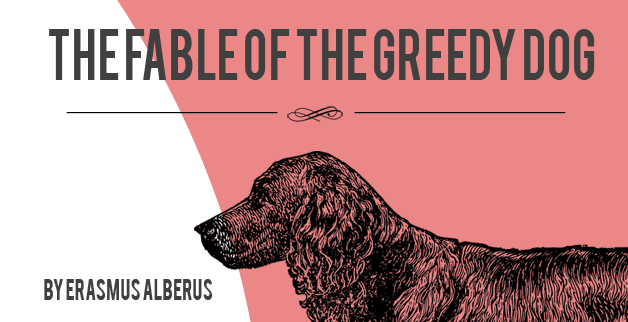
The Carl-Kehr-Schule in Halberstadt offers a content-rich website with tons of easy German short stories in a wide range of categories. You’ll find stories about animals, seasons, quizzes, fables, legends, ballads and much more.
While these texts are originally intended to help deaf children boost their vocabulary and reading skills (see my post on Leichte Sprache), they are actually really helpful for German learners as well, since the stories are very short and to the point.
The presentation of the website may look a bit outdated, but don’t be discouraged. This is a treasure trove of easy German short stories, all available in convenient PDF format, many of them even with illustrations. The stories are organized according to categories: Märchen (fairy-tales), Sagen (legends), Fabeln (fables), Schwänke (droll stories), animals, and much more.
For example, here’s a very short fable entitled “The Greedy Dog”, originally by Erasmus Alberus, retold in easy German:
![]() Read PDF via: sos-halberstadt.bildung-lsa.de
Read PDF via: sos-halberstadt.bildung-lsa.de
And since we’re talking about Leichte Sprache, I’d also like to mention Bremen Lebenshilfe, a registered association that is dedicated to helping the mentally handicapped, and their website in simplified German with easy German short stories.
The stories cost a few euros each, but they also provide a free sample which showcases the barrier-free layout and fitting illustrations. While originally designed for people with handicap, I think these short stories can be an excellent way for beginner German learners to start reading.
![]() Read PDF via: leichte-sprache.de
Read PDF via: leichte-sprache.de
5 German Post-WWII Short Stories

Trümmerliteratur (“rubble literature”) was a German literary movement that began somewhere after World War II, dealing with both the literal and metaphorical rubble. Taking the American short story as a model, authors of this movement employed very simple and direct language as a way of coming to terms with the new post-destruction reality. They focused on clear and concise descriptions, and cut out a lot of the embellishments of prior literary movements.
It is precisely this simplified language which can serve as a stepping stone for German learners to make their first forays into literary German without getting bogged down in endlessly meandering sentences.
As mentioned in the intro, I’ve selected and summarized five of these stories for you.
Short Stories, Novels & More From The Goethe Institute

The Goethe Institute offers more than 35,000 German language media, including novels, magazines, audiobooks and of course short stories in their eLibrary titled “Onleihe” (a wordplay on ‘online’ and ‘ausleihen’, i.e. to borrow). After registering a free account you can borrow desired titles for up to 2, 4 or 7 days.
Before signing up you can browse their library and check out free reading samples. Tip: Enter “Kurzgeschichte” into the search form to filter for “short stories”. As of the time of this writing, Onleihe offers more than 82 entries for this keyword, some even with audio. For beginners, I’d recommend checking out the graded readers by “Hueber” (example).
The only restriction for using Onleihe is that you need to have a permanent residence outside of Germany. If you’re currently located in Germany, you can still use the Onleihe, but will have to access its contents via the digital portal of your local library.
Talking about Goethe, the Goethe Institute Spain has used to have a nice collection of German short stories and excerpts from novels (sorted by levels from A2 to C1) by contemporary authors. Most of these come came with interactive exercises, text comprehension questions, quizzes and some even have integrated audio. Unfortunately these resources have since been removed but you can still access some of the archived versions on the WayBackMachine.
Learn German With Stories: Dino lernt Deutsch
Last but not least, I’d like to point you to my ongoing story series for German learners titled Dino lernt Deutsch, designed for language learners (from absolute beginners and upwards) who are tired of the same old practice sentences and want to build up their confidence without getting overwhelmed.
In essence, it’s a comedy/travel-series about a young man from Sicily who tries to pave his path in the German speaking world, in each episode exploring one city in Germany, Austria, Switzerland and beyond, chock-full of cultural misunderstandings and other bewildering discoveries. The first book Café in Berlin was released in 2013, and ever since I’ve been continuously working on the series which now has more than 10 volumes.
These books start out at around the A1/2* level, gently sloping up towards B1/2 over the course of the series. For more detailed information about difficulty levels see the quick start guide. Or you can just dive right in and browse through the excerpts for each book to get a feel for the difficulty level.
All the books are available on paperback, Kindle, Apple Books, etc., or as DRM-free MOBI/EPUB/PDF downloads directly from our site, alongside audio editions, flashcards, bonus materials and much more:
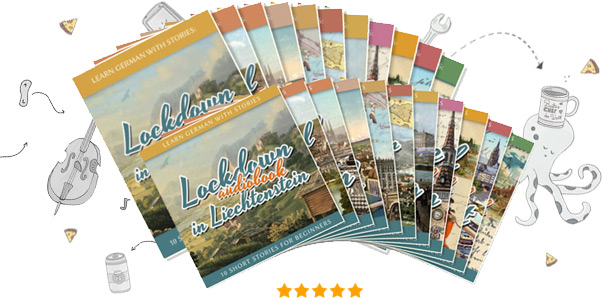
*If you’re interested in delving into the technicalities of CEFR and a bit of my general writing philosophy behind these books, also check out this post on my personal blog.
–

